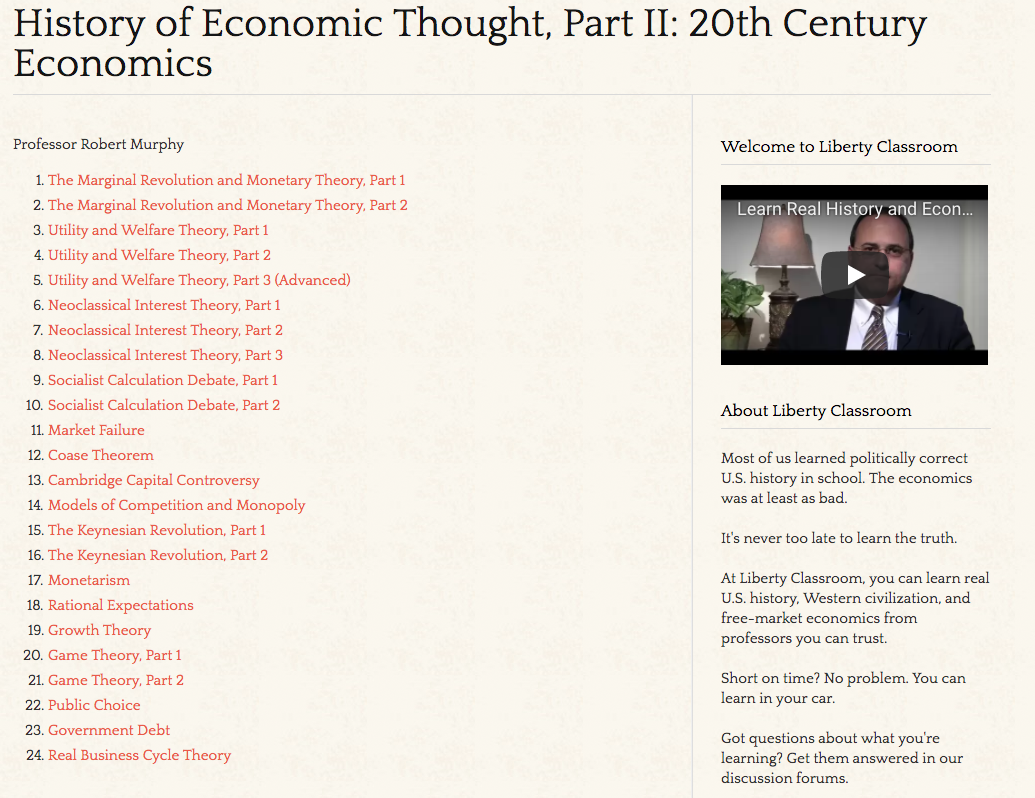Murphy’s “History of Economic Thought Part II” Now Available on Liberty Classroom
Hey boys and girls, the second installment of my course on the History of Economic Thought is now available at Tom Woods’ Liberty Classroom. This second installment is a tour of 20th century thought, covering the following topics:
As the list indicates, some of these topics can get a bit technical. I’d like to think that I struck a good balance, providing the intuitive overview of important concepts (such as the “Lucas critique”) for the layperson, while also giving some of the technical details for grad students and/or other economists who may not have studied some of these areas.
My goal in these lectures is to get the student to pass a Turing test for the material in question. For example, I don’t spend much time at all criticizing Keynes; instead I try to interpret what he’s doing in the sections that I chose to highlight from his book. (I also point out that his infamous “in the long run we’re all dead” was NOT a justification for deficit finance.)
I spend a lot of time on capital and interest theory, since that is my specialty, and I hope I convince the student why the Austrian insights here are so crucial. But I also spend a lot of time on game theory, since I think there is a lot of confusion even among mainstream economists on things like a “mixed-strategy equilibrium.”
The last plug I’ll give is this: After I uploaded the last video, I was much more relaxed when considering the prospect of being hit by a bus. I thought, “I have done my part for humanity by distilling a lot of my knowledge of economics into this 2-part History of Thought course. If I die tomorrow, so be it.”
So go sign yourself up for Tom Woods’ Liberty Classroom.








Nice. More gym tunes.
I’ll ask it again even though I know better than to expect an answer : what happened to Mises Academy? LC is great but MA was better as it was live.
Jan wrote:
“I’ll ask it again even though I know better than to expect an answer…”
I am constantly impressed with how many people ask me for information / a favor by leading off with an insult/criticism.
Why did you start your question like that? Do you think there is some conspiracy we have to deny you the truth regarding the fate of the Mises Academy? If you asked me that before and I didn’t answer, I’m guessing it was because I didn’t see your question.
They stopped doing M.A. I think because the overhead was too much. It didn’t make sense for a small class, and for a big class there were always people who had internet problems etc. and it just didn’t really work to keep doing it for all the labor it tied up.
Wow, I did not expect this reaction although looking at my post again I can see why you would think I am criticising you. But I am not. It’s meant in jest and it was not even aimed at you. I asked this so many times that the last time I did someone here told me to shut up already, so it was aimed at him.
A few months into the M.A. they cut the prices in half and I remember thinking this might be a problem as I don’t see how it can be making money. Well, it’s a shame but the market has spoken.
I am sorry that I irritated you as I really respect you. I’m signing up for the L.C. now.
Hmm OK sorry Jan. I have a short trigger lately from people on social media platforms launching bombs at me.
I will leave this up as a monument to my mistaken temper tantrum, as a warning to others to guard their emotions…
Well, though in fun I did write a smart-alecky post so don’t be so harsh on yourself 🙂 besides, I don’t read Twitter myself but I’m sure there is more than a few jerks on it and I wouldn’t want you to pull any punches on my account 🙂
I like the technical stuff, personally; I greatly enjoyed how fully you dove into Arrow’s Impossibility Theorem.
After explaining how Arrow proved that election outcomes are controlled by a dictator, it’s important to also explain the companion theorem that proves nobody’s vote makes any difference at all.
http://www.stat.columbia.edu/~gelman/research/published/probdecisive2.pdf
I think there’s limitations to the use of marginal thinking in certain problems, but more importantly none of the voters know whether they will be the “dictator” or not, therefore they have very limited capability to exercise this power. There’s a number of advantages to secret ballots, and this is one of them.
Tel wrote: “After explaining how Arrow proved that election outcomes are controlled by a dictator, it’s important to also explain the companion theorem that proves nobody’s vote makes any difference at all.”
Tel, I can’t tell if you are being somewhat tongue-in-cheek, but this isn’t right. First of all, Arrow didn’t show that election outcomes are controlled by a dictator. He just showed that if a social choice mechanism obeyed his other postulates (all of which seemed innocuous enough), *then* there must be a dictator. But e.g. if a society decides things through elections, Arrow wouldn’t say “Ah! There’s actually a secret dictator.” No, he’d say, “Ah! Your social choice system is vulnerable to intransitivity.”
Well Arrow imposed the criteria that no “dictator” or pivotal voter can exist such that this single person’s vote entirely determines the outcome. This is from Wikipedia: